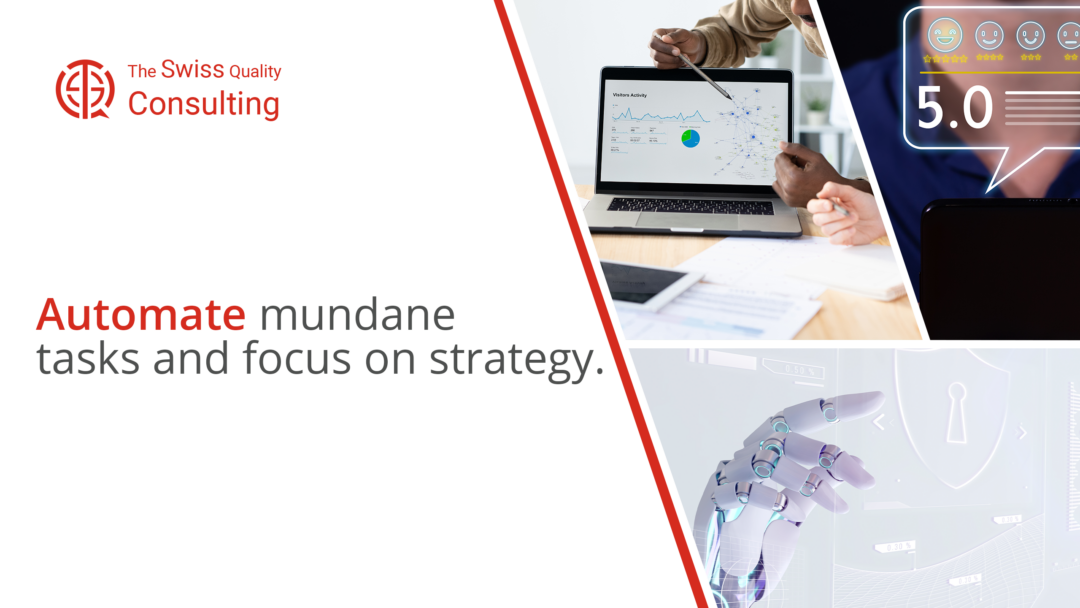Strategic Focus in Management: Leveraging Automation for Success
In the fast-paced world of business, the adage “Automate mundane tasks and focus on strategy” has become increasingly relevant. Business executives, mid-level managers, and entrepreneurs are recognizing the significance of this approach in driving efficiency and success. This article explores how integrating automation, particularly in the context of generative artificial intelligence (AI), can redefine business operations and strategy.
The Impact of Automation on Change Management
Change management plays a crucial role in successfully integrating automation into business processes. The transition from traditional, manual methods to automated systems is not merely a technical update; it represents a fundamental shift in how a business operates. This transformation requires a comprehensive strategic overhaul, going beyond mere technological adoption to encompass a rethinking of operational workflows and organizational structures.
The process begins with a thorough assessment of current business processes. This involves analyzing each step of existing workflows to identify tasks that are routine, time-consuming, and prone to human error. These are the tasks that stand to benefit most from automation. The goal here is to streamline operations, reducing the burden of repetitive tasks on employees and allowing them to focus on more complex, value-adding activities.
However, implementing automation is not just about installing new software or systems. It requires careful planning to ensure a smooth transition. This includes creating detailed roadmaps for the integration process, setting realistic timelines, and establishing clear goals and metrics to measure the success of the automation initiative. Training and support systems are also essential to help employees adapt to new tools and processes.
Another critical aspect of change management in this context is communication. Clear, transparent, and ongoing communication is vital to address any concerns or resistance among employees. It’s important to involve staff at all levels in the process, seeking their input and feedback. This not only helps in identifying potential issues early on but also fosters a sense of ownership and acceptance among the workforce.
Furthermore, effective change management in automation also involves considering the broader impact on the organization. This includes evaluating how automated processes will interact with other parts of the business and ensuring that there is alignment with the company’s overall strategic objectives. It may also necessitate redefining job roles and responsibilities to accommodate the new, more efficient workflows.
In addition, leadership plays a pivotal role in this transition. Leaders must not only endorse the shift towards automation but also actively champion it. This means leading by example, demonstrating a commitment to the new automated processes, and reinforcing their benefits to the organization’s overall strategy and goals.
In essence, change management in the context of automating business processes is a multifaceted and dynamic endeavor. It involves a strategic realignment of business operations, a thorough understanding of the organization’s workflows, effective communication and training, and strong leadership. By addressing these aspects, businesses can ensure that the integration of automation is not only technically successful but also positively received by the workforce, ultimately leading to enhanced efficiency, productivity, and strategic focus.
Executive Coaching for Strategic Leadership
Executive coaching services are instrumental in preparing leaders for this transition. Coaches provide insights and tools for executives to effectively manage the integration of automation. This encompasses developing a vision for how automation can enhance business operations and guiding teams through the transition. A key focus is on cultivating leadership skills that enable executives to leverage automation for strategic advantage, including critical thinking, adaptability, and innovative problem-solving.
Effective Communication in Automated Environments
Effective communication becomes even more crucial in automated business environments. As mundane tasks are automated, the role of communication shifts towards more strategic discussions, idea generation, and collaborative problem-solving. Ensuring clear and open communication channels is essential to maximize the benefits of automation and to maintain team cohesion and morale in a technologically evolving workspace.
Generative AI: A Catalyst for Strategic Business Operations
Generative AI is at the forefront of this automation revolution. It goes beyond simple task automation; it has the capability to generate new, innovative solutions for complex business challenges. By leveraging generative AI, businesses can not only automate mundane tasks but also gain insights and strategies that were previously unattainable. This technology enables businesses to stay ahead of the curve, constantly innovating and adapting to market changes.
Project Management in the Age of Automation
Project management also undergoes a significant transformation with the adoption of automation. Automated tools can handle routine aspects of project management, such as scheduling, resource allocation, and progress tracking. This allows project managers to focus on more strategic aspects like risk management, stakeholder engagement, and aligning projects with overall business objectives.
Conclusion Automate Mundane Tasks
In conclusion, the concept of “Automate mundane tasks and focus on strategy” is not just a tactical move but a strategic imperative for modern businesses. The integration of automation, particularly through generative AI, presents a unique opportunity for businesses to enhance efficiency, foster innovation, and achieve long-term success. It’s a journey that requires careful change management, strategic leadership, effective communication, and a forward-thinking approach to project management.
#BusinessAutomation, #StrategicManagement, #Leadership, #GenerativeAI, #ProjectManagement









